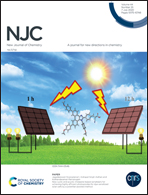Improved low-temperature catalytic oxidation performance of Pt-based catalysts by modulating the electronic and size effects†
Abstract
Polyvinyl alcohol (PVA) has been shown to interact with platinum ions by manipulating the reaction time. It was interestingly found that the improved low-temperature oxidation performance of Pt-based catalysts in promoting the conversion of CO/C3H6/NO was mainly contributed to by a higher content of metallic platinum species, accompanied by relatively smaller platinum nanoparticle size. Besides, DTA and in situ DRIFTs of the un-roasted catalysts showed that an appropriate reaction time (10 h) between the platinum ions and polyvinyl alcohol resulted in a strong electronic intensity of the platinum. Both these factors led to a greater formation of formate species and the lowest light-off temperature of CO (176 °C), C3H6 (187 °C), and NO (214 °C). This simple method involving tuning the interaction of polymer and metal ions would be positive for optimizing the electronic state and size efffect of metals in catalysis.



 Please wait while we load your content...
Please wait while we load your content...